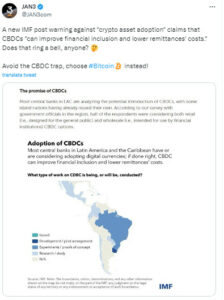Among all the financial institutions, the International Monetary Fund (IMF) has closely monitored the development and impact of cryptocurrencies since their inception.
Initially skeptical, the IMF has gradually adapted its stance and is now reevaluating its approach, recognizing the need for a new standard in the form of Central Bank Digital Currencies (CBDCs). In this article, we’ll make a quick timeline of how this financial institution reacted to cryptos since its creation. And also, trying to avoid countries using them at all costs.
Addressing Financial Stability Concerns
The IMF’s primary concern was maintaining financial stability in the face of the rapid growth and volatility of cryptocurrencies. It emphasized the importance of monitoring and regulating crypto exchanges, imposing Know Your Customer (KYC) and Anti-Money Laundering (AML) requirements, and implementing investor protection measures. The IMF also urged member countries to strengthen their regulatory frameworks to prevent cryptocurrencies from becoming vehicles for financial instability.

Source: Twitter
Skepticism and Initial Reaction
When cryptocurrencies, spearheaded by Bitcoin, burst onto the scene in 2009, the IMF was cautious, expressing reservations about their potential risks and implications. The decentralized nature of cryptocurrencies raised concerns over money laundering, tax evasion, and the financing of illicit activities. These factors led the IMF to advocate for stringent regulations and surveillance measures to mitigate the associated risks. Here is when they tried to make El Salvador quit their Bitcoin adoption Policy.

Source: Twitter
We need to remember that the IMF is currently trying to avoid Argentina to adopt cryptos by giving them a $45 billion economic package. Nowadays, Argentina has just missed payments.
Evolution of Attitude
Over the years, as cryptocurrencies gained popularity and attracted significant investment, the IMF’s attitude shifted from skepticism to a more nuanced approach. Recognizing the potential benefits of blockchain technology, and the underlying innovation behind cryptocurrencies, the IMF began exploring its applications in the financial sector. Especially CBDCs.
It acknowledged the potential for faster and more cost-effective cross-border transactions, financial inclusion for the unbanked, and improved transparency and accountability.

Source: IMF.org
Regulatory Frameworks and Collaborative Efforts
The IMF increasingly realized that banning cryptocurrencies outright would be ineffective due to their decentralized nature. Instead, it focused on developing regulatory frameworks to harness the benefits of cryptocurrencies while mitigating their risks.
The IMF collaborated with other international bodies, such as the Financial Stability Board (FSB) and the Financial Action Task Force (FATF), to develop coordinated approaches to cryptocurrency regulation.

Source: Twitter
Shifting Focus to CBDCs & Transitioning to the New Standard
While grappling with the challenges posed by cryptos, the IMF recognized the need to adapt to the evolving financial landscape. Central Bank Digital Currencies (CBDCs) emerged as a potential solution, offering the benefits of cryptocurrencies while maintaining central bank control and regulatory oversight. CBDCs, issued and regulated by central banks, provide a digital representation of a country’s fiat currency.
The IMF’s recent shift in strategy is driven by the understanding that CBDCs can offer the best of both worlds: the efficiency and innovation of cryptos coupled with the stability and control of traditional fiat currencies. By embracing CBDCs, the IMF acknowledges that these digital currencies can serve as a viable alternative to cryptocurrencies, while still adhering to the regulatory and monetary policies set by central banks.
Source: Twitter
Adapting to a Changing Landscape
Recognizing the potential of CBDCs to address existing gaps in the financial system, the IMF is now actively working with member countries to support their adoption and implementation. The IMF has become a proponent of CBDCs, providing technical assistance and policy guidance to central banks seeking to develop and launch their digital currencies. It also advocates for international cooperation and harmonization of CBDC standards to facilitate cross-border transactions.

Source: Twitter
Conclusion
The IMF’s attitude towards cryptocurrencies has evolved significantly since their inception. From initial skepticism and concerns about their risks, the IMF has gradually recognized the potential benefits of blockchain technology and its application in the financial sector. While acknowledging the importance of regulating cryptocurrencies, the IMF has shifted its focus to Central Bank Digital Currencies (CBDCs) as a new standard that can provide a balance between innovation and stability. By embracing CBDCs, the IMF aims to address the shortcomings of cryptocurrencies while ensuring regulatory compliance and maintaining financial stability.
As the world moves toward a more digitized future, the IMF understands the need to adapt to the changing landscape of the financial industry. Also, the IMF’s shift in strategy is not a surrender to the policy of banning cryptocurrencies, because they realized that CBDCs are good for it. Now, the MFI and other organizations will begin to change their tune by going in the same direction that BlackRock and similar investment funds decided to go.



 By
By
 By
By
 By
By
 By
By
 By
By